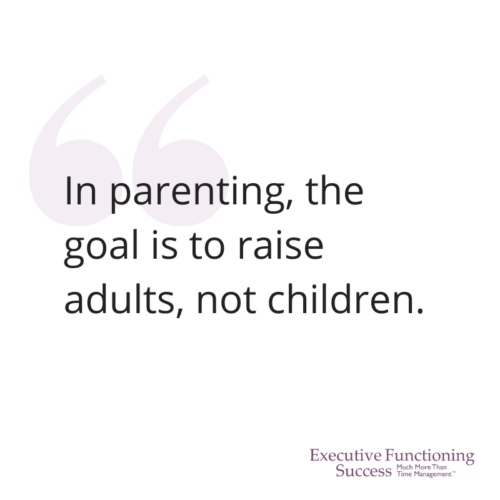Here is my favorite quote at the moment: “Expectations are predetermined disappointments.”
Kind of brutal but so true – especially in my experience with folks struggling with executive functioning.
Unrealistic expectations are at the root of SO much pain. Parents and teachers often expect children and adolescents to step up and independently complete certain tasks before they are ready. The result is more and more children who struggle with anxiety.
I get it. As a parent, before I understood the connection between the brain and behavior, I too was guilty of unrealistic exceptions. It took me years to unlearn this habit and accept myself and others exactly where they are in their journey.
Today, with all of our available knowledge about brain development, it is both fascinating and frustrating to me how little we acknowledge the brain’s connection to executive functioning skills as we age. In newborns and toddlers, we accept that motor and verbal skills won’t develop until they reach a certain point in their development. We know that they can’t do what they can’t do.
Alas, once the wonders of walking and talking arrive, we quickly forget that executive functions play a key role in the brain’s development. We want benchmarks, and we want them to happen on schedule. And when they don’t, the unrealistic expectations begin.
Transition Points and Executive Function Support Strategies
I’d like to swap out the word “expectations” and replace it with “transition points.” Developmental age is a spectrum, and can vary widely! Here is a brief list of transition points and how we best support a maturing brain’s executive functions.
Three-to-Four-Year-Old Executive Function Supports
 To be successful, executive functioning at this time of life requires parents and teachers to step up and create consistent predictable environments. This includes:
To be successful, executive functioning at this time of life requires parents and teachers to step up and create consistent predictable environments. This includes:
- Routines for everything. When a brain is in a consistently positive and calm environment, it is easier for the child to respond appropriately. Predictability leads to less effort and stress for everyone.
- Simple external tools like the Time-Timer can help them visualize time in the early years.
- A powerful support tool is a family whiteboard with the “daily schedule” on it. For little ones who can’t read, you can draw images on the whiteboard to represent the order of activities. (There are a few options linked on our Cool Tools page.)
Five-to-Eleven-Year-Old Executive Function Supports
 These are the years when parents and teachers work alongside children, explicitly demonstrating and teaching them how to do things.
These are the years when parents and teachers work alongside children, explicitly demonstrating and teaching them how to do things.
Parents should model expectations, gradually turning over the tasks for independent completion, but only after weeks of monitored support. Here are some examples:
- Specifically, teach them how to make a bed, pack lunch and tidy a bedroom. Demonstrate how to organize school papers in a binder. Time how long it actually takes to do these tasks, making time visual using time circles.
- Set and stick to consistent routines for before school, after school and bedtime.
- Set up smoother morning routines by organizing the night before. Teach children to prepare their backpacks, shoes, and jackets. A lunch bag next to the backpack will be a visual reminder in the morning to get the refrigerated lunch items before they leave.
- Introduce a family wall calendar to build the critical EF skills of future thinking. Color code different family member’s activities. Direct children to write down their own events on the family calendar, such as birthday parties. Adults should direct children to check the calendar when they want to know when an event is occurring rather than providing the answer.
Middle School Executive Function Supports
 During the teen and pre-teen years, parents and teachers need to gradually switch from being micromanagers to coaches guiding from the sidelines. This means that more independence should be expected, but only as the child demonstrates the foundational executive function skills needed for that independence.
During the teen and pre-teen years, parents and teachers need to gradually switch from being micromanagers to coaches guiding from the sidelines. This means that more independence should be expected, but only as the child demonstrates the foundational executive function skills needed for that independence.
This is tricky because the brains and bodies of middle schoolers are all over the map in terms of development. Adults need to pay attention to individual brain differences to provide support for that practice and problem-solving.
Like coaching athletic skills, executive function skills need consistent practice and application to new situations. Here are some ways to do that:
- Maintain a monthly paper family calendar for key events and activities. Students add their own events. Keep it posted visibly at all times and refer to it often.
- Hold weekly family meetings to communicate about upcoming activities and how that will impact all family members.
- Don’t be afraid to set limits. Keep up family routines for sleep and limited screen time.
- Add more domestic contributions (chores). Teach them how to do those chores, reverting to working alongside them and gradually switching over to independence with you watching and correcting their efforts. They should know how to clean a toilet, do their laundry (including folding and putting away), and make dinner once a week for the family from scratch. (Yes. I did that as a 12-year-old and so did my children.) This can be hard for those with executive function weaknesses – but there are ways to develop kitchen skills, which they will need once they leave home!
- Allow for brain differences. Children with ADHD are often 3-5 years delayed in their brain’s executive function capacity.
High School Executive Function Supports
 During the high school years, the gap between expectations and brain development can become a significant problem for many students. Students with inadequate EF skills simply lack the brain development and underlying executive function training to manage the increased demands for independence, even though both the students and their parents long for that independence.
During the high school years, the gap between expectations and brain development can become a significant problem for many students. Students with inadequate EF skills simply lack the brain development and underlying executive function training to manage the increased demands for independence, even though both the students and their parents long for that independence.
These can be challenging years for parents. The best path for executive function development in high school is going back to that concept of being a coach – one that can’t go on the field and guarantee success for the player. A coach who builds skills through practice, who looks at a “failure” as a teachable moment. One who helps the student to consider what they could do differently to set up a better outcome in the future.
Being a coach isn’t easy. Keep in mind that the goal is to raise adults, not children.
- Have a weekly family meeting to share current calendar commitments. This teaches looking ahead to avoid conflicts and upsets at the last minute.
- Maintain a paper family calendar or planner that is easily accessible for family to add commitments or track upcoming events.
- Continue to use a shared whiteboard for family members to write down weekend to-do lists. Include fun activities on the lists. We all need time for fun.
- Schedule time with individual family members to touch base doing something fun. Students often share more of what is going on when they are riding in a car.
- Set them up with a bank account and teach them how to budget and monitor their own spending. Have them set up a savings plan.
- Expect them to have a paid summer job. Teach them how to apply for a job, fill out applications and do mock interviews with them. Applying for work is scary for all ages.
- Be patient. This stage of life is challenging on so many levels. They are going to make mistakes. So will you. It’s ok.

Post High School Graduation Executive Function Supports:
 This is the most frustrating transition. At 18, a child is suddenly given the rights of an adult. Legally they are independent.
This is the most frustrating transition. At 18, a child is suddenly given the rights of an adult. Legally they are independent.
Practically, many are not ready for adulthood. Yet tradition has us sending them out the door, often to college, even though they struggled to be independent in high school.
I think both students and parents want to believe that some magic will happen when they step on a college campus. For too many, they find failure and give up before they are mature enough to independently succeed.
The wounds of that failure can last a lifetime. If you have a student with delayed executive functioning, change your expectations. You want to set up success, not failure.
Consider these options as a transition time to grow their brain’s EF skills.
- Do a test run at a community college. If the student can get a passing grade in a class subject that they don’t like (without your help or someone else holding their hand) then they are ready for independent college life.
- Plan a gap year that involves leaving home, the country even. Many programs will connect travel with volunteer work opportunities.
- Get an entry-level job in a profession that sounds interesting to them (or any job for that matter). Stick with it for at least six months.
- College may still happen, just not yet. Don’t waste your hard-earned money or have the student go into debt before they are ready to meet the demands of college. When they are ready, they will have a purpose to focus. Give them money for college then.
I believe that good executive functioning skills boil down to being able to function as an adult who just does what needs to be done. We build those skills, that way of thinking very early, step by step. Each transition is the building block for the next transition.
If we align our expectations to what the brain can realistically do, we can avoid disappointments and set up success. And that is a beautiful thing.
Little by little…


